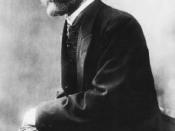Many feminists would say that religion (like the family and the welfare state...) is another site of patriarchy. It is a place where women are oppressed by men, and it serves to reproduce this oppression and spread it throughout the wider society. The Catholic Church is a favourite target. It is against women's rights such as contraception, abortion, and divorce. It is headed and run exclusively by men. God is seen in male terms; Jesus is a man; and although there is great respect for the Virgin Mary, she is hardly a useful role model for most women today. Islam has also been criticised on similar grounds. We will look at the practice of veiling, which many feminists see as oppressive. Watson's qualitative research, on the other hand, tries to show that veiling can be liberating for women. Further arguments against the feminist view of religion being always patriarchal include the Church of England, now accepting women priests; and the growth of some new religious movements which value femininity, such as Wicca and "Earth Goddesses".
The key concern of functionalist writing on religion is the contribution that religion makes to the well being of society, its contribution to social stability and, value-consensus. Durkheim argues that the function of religious ritual is to maintain social solidarity by affirming the moral superiority of society over its individual members. Durkheim believed that social life could only exist if values were shared and society integrated into a coherent whole. Religion is an important aspect of this process, not only providing a set of unifying practices and beliefs, but also by providing a way in which people can interpret and give meaning to the world. Durkheim's distinction between the sacred and profane is, in effect, the distinction between people and society. For Durkheim the...



Outstanding effort, but one point:
The role of religion was shown all too clearly when Hitler used the churches to sanction his destruction of minorities, and Pope Pius not thinking it worth the effort to overturn the applecart by complaining about the 6 million being slaughtered. Useful to inciter social revolution,indeed.
Nevertheless, your critical analysis of a wide array of sources and academics is very impressive.
1 out of 1 people found this comment useful.